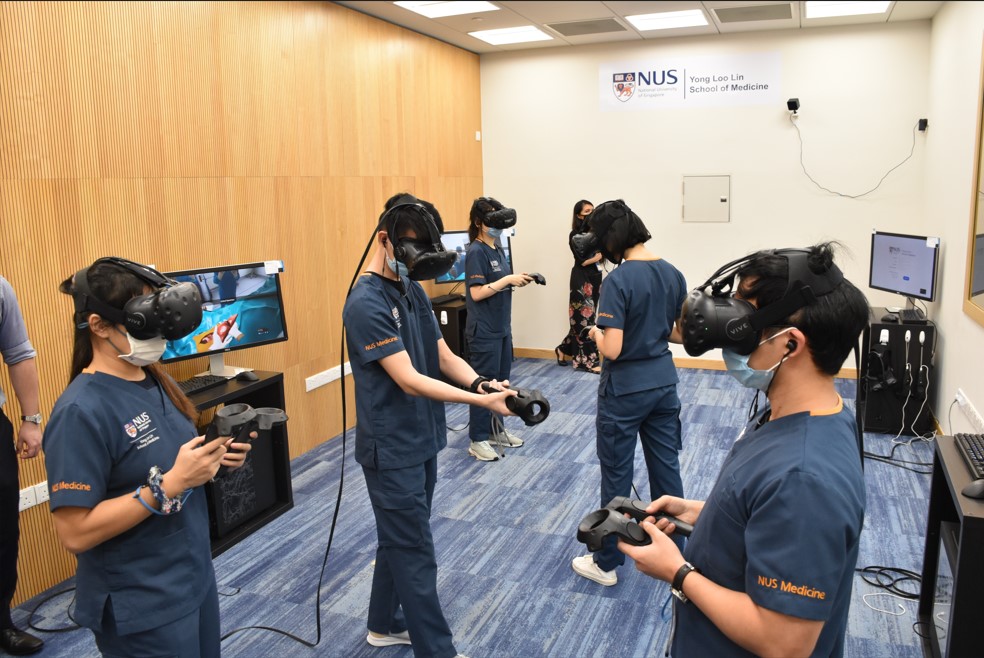The Clinical Skills Foundation Programme (CSFP) is conducted in Phase II of a medical student’s academic journey with the goal of instilling in them a solid base upon which their future clinical competencies can be built.
Phase III is a medical student’s first foray into clinical exposure. It serves to build upon the knowledge foundation of Phase I and II, expanding into clinical work via surgery team embedding. Surgery posting in Phase III focuses on conceptualization. In it, medical students are exposed to core clinical practice topics, granting them an understanding of how their knowledge links to the wider surgical practice. Leveraging on our partnerships with the various hospitals in Singapore, we provide an ideal decentralized environment for students to undergo their hospital attachment.
Phase V is the final stop of a student’s academic journey that serves to round off their prior years of medical education with a series of rigorous clinical postings. Surgery posting in Phase V focuses on competency starting off with a recap of surgical knowledge in the context of managing surgical patients. It then flows naturally into practical territory where students undergo a ward-based 4-week Student Internship Programme (SIP) across the various Surgery specialties and hospitals in Singapore, with the aim of providing them with clinical training in the management of a wide spread of surgical patients and conditions. The posting also incorporates teaching content going in depth about the approaches and management of common surgical conditions across the specialties.
As part of their curriculum, Phase III and IV medical students are required to complete 16 weeks of electives (Phase III – 4 weeks, Phase IV – 12 weeks).

The Clinical Skills Foundation Programme (CSFP) is conducted
in Phase II of a medical student’s academic journey with the goal of instilling
in them a solid base upon which their future clinical competencies can be
built.
The key objective of CSFP is to give students a full
appreciation of:
- Clinical skills in history taking and physical
examination
- Skills for effective communication with patients
and their relatives
- Basic set of procedural skills
To do so, students are exposed to a variety of clinical
environments combined with interactive tutorials in the domains of Surgery and
Medicine. Some Surgery topics include:
- Abdomen & Inguinal Hernia
- Breast, Lumps & Bumps
- Arterial Systems of Lower
Limbs
Phase III is a medical student’s first foray into clinical
exposure. It serves to build upon the knowledge foundation of Phase I and II,
expanding into clinical work via surgery team embedding.
Surgery posting in Phase III focuses on conceptualization.
In it, medical students are exposed to core clinical practice topics, granting
them an understanding of how their knowledge links to the wider surgical
practice.
Leveraging on our partnerships with the various hospitals in
Singapore, we provide an ideal decentralized environment for students to undergo
their hospital attachment.
In each hospital, students can expect to be exposed to
various Surgery specialties, examples include:
- Breast Surgery
- Colorectal Surgery
- Endocrine & Minimally Invasive Surgery
- Hepatobiliary & Pancreatic Surgery
- Paediatrics Surgery
- Trauma Surgery
- Upper Gastrointestinal Surgery
- Urology
- Vascular Surgery
Students will benefit from a well-rounded clinical exposure
across various specialties, getting hands-on opportunities in the wards,
clinics and operating theatres. These are also supplemented with interactive
lectures and value-add workshops to enhance their confidence and capabilities as
first-time medical students in a clinical setting.
Phase V is the final stop of a student’s academic journey
that serves to round off their prior years of medical education with a series
of rigorous clinical postings.
Surgery posting in Phase V focuses on competency starting off
with a recap of surgical knowledge in the context of managing surgical patients.
It then flows naturally into practical territory where students undergo a
ward-based 4-week Student Internship Programme (SIP) across the various Surgery
specialties and hospitals in Singapore, with the aim of providing them with
clinical training in the management of a wide spread of surgical patients and
conditions. The posting also incorporates teaching content going in depth about
the approaches and management of common surgical conditions across the
specialties.
Examples of specialties students may be exposed to:
- Breast Surgery
- Colorectal Surgery
- Endocrine Surgery
- Hepatobiliary Surgery
- Vascular Surgery
- Upper Gastrointestinal Surgery
- Urology
During SIP, students will be attached to a surgical team led
by a consultant and directly supervised by the team registrar who is assisted
by the medical officer (MO) and house officer (HO). Some of the activities
student interns can be expected to perform are:
- Participating in ward rounds, presenting the
cases and management plans to their team.
- Clerking cases, writing progress notes, and
being responsible for following up on patient investigation results.
- Assist in or perform simple surgical procedures
they have previously performed under supervision.
At the end of the SIP, students are assessed based on their
practical skills and professionalism. Understanding of key concepts and their
effects on patient management and care is separately assessed at the end of the
Surgery posting in the form of End of Posting Tests.
As part of their curriculum, Phase III and IV medical students are required to complete 16 weeks of electives (Phase III – 4 weeks, Phase IV – 12 weeks). Students can choose electives from: